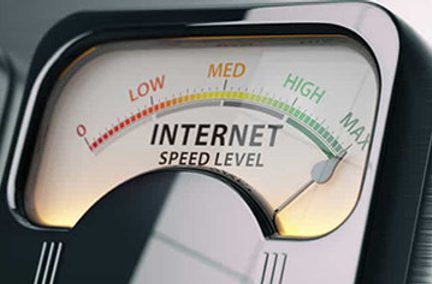The Best Internet Speeds for Online Gaming
Jun 24, 2025 | Home Technology, Online Gaming, E-Sports

Online gaming requires more speed and uses more bandwidth than most other internet-based activities. It’s a giant bandwidth suck. And it can cause rude amounts of frustration if your internet connection slows down at the worst times.
For gamers, nothing is quite as exasperating as having an intense session of Fortnite or a high-stakes match in a first-person shooter ruined by lag, high ping, or a slow internet connection. Whether you’re playing on a gaming console like Xbox, PlayStation, or Nintendo, or a high-powered PC, your internet speed, latency, and overall connection can make or break your online gaming experience. It can be the difference between winning and losing. And nobody wants to be a loser.
So, how do you avoid this embarrassment?
Understanding Key Terms: Speed, Bandwidth, and Latency
Let’s start with some basics before we get all fancy. (If you’re already a tech wiz, you can skip this part.)
Internet speed is typically measured in megabits per second (Mbps), which refers to how quickly data can be downloaded or uploaded between your gaming device and the game server (i.e., transfer rate).
Bandwidth is the capacity of your internet connection to handle data transfer, which becomes especially important when multiple devices are active on your home network.
Latency or ping, often measured in milliseconds (ms), is the delay between your action in-game and the server’s response, commonly called ping rate. Think of it like a submarine pinging its sonar to find the nearest target. Distance to target is measured by how long it takes the sound to go out, hit the target, and return. Ping in the gaming world is much the same in that it takes time for the signal from your game system to hit the server and the return signal to get back to you. Faster (lower ping) is better.
What Is a Good Internet Speed for Online Gaming?
For most online gaming activities, including multiplayer games and competitive gaming, a minimum download speed of 3-8 Mbps and an upload speed of 1-3 Mbps is required. However, these are just the bare minimums for the game to function at its slowest rate. For a smoother, more reliable connection, especially if you’re gaming on platforms like PlayStation, Xbox, or PC, or if your household has multiple gamers, you’ll want higher speeds:
- Download speed: 15-25 Mbps or higher per gaming device is recommended for lag-free gameplay, especially in real-time multiplayer games. Keep in mind, this is assuming your game is not competing with other smart devices in the home also vying for bandwidth at the same time.
- Upload speed: For consistent performance, you should use at least 3-5 Mbps, particularly if you stream your gameplay on Twitch or upload gaming videos. However, in a perfect world (one with fiber internet), your upload and download speeds would be symmetrical.
- Latency/Ping: For the best online gaming experience, aim for a ping rate under 50 ms. Lower latency means faster, more responsive gameplay.
While the requirements listed above may not seem all that high, keep in mind you probably won’t be gaming in isolation. You will probably be sharing bandwidth with other devices in your home at the same time, meaning you won’t be able to tap into the full bandwidth your ISP is providing just for gaming.
For example, if you have a 100 Mbps plan and need 25 Mbps to game, that leaves only 75 Mbps second for everyone else. But if you have a 1 Gig plan, that leave ove 900 Mbps for the rest of the household, reducing the strain on your game.
One thing you unfortunately can’t control is the connection speed on the other end, i.e., the game server. This discrepancy can affect your gameplay and how fast you can download updates. For example, when a new version comes out, everybody wants it on day one, but that means everyone is trying to download it at the same time, which can slow down the connection speed because the server is bogged down. Even the fastest connection on your end won’t change that. You’ll either have to be patient or wait a few days until the hype is over and the game producer’s server traffic has lightened up.
Why Low Latency and Bandwidth Matter More Than Just High Speed
A high-speed internet plan with impressive Mbps numbers is great, but you’ll still experience lag and delays if your latency is high. This is one area where fiber optic broadband is often considered the best internet for gaming: it offers both high speeds (often up to gigabit or even multi-gigabit levels) and ultra-low latency.
Bandwidth also plays a crucial role. If your home network is congested with multiple users streaming, downloading, or gaming all at the same time, your gaming performance can and likely will slow down. A higher bandwidth internet service plan gives everyone more online access, ensuring your connection speed doesn’t slow during peak gaming sessions or when your family is engaged in other online activities.
Wired vs. Wi-Fi
While modern Wi-Fi can deliver fast internet speeds, a wired connection to your gaming console or PC is still the gold standard for competitive gaming. Wired connection provides lower latency, higher bandwidth, and a more reliable connection than Wi-Fi, which can suffer from interference, network congestion, and fluctuating speeds. If you must use Wi-Fi, invest in a quality gaming router and position your device close to the router for the best results.
Streaming While Gaming
Livestreaming while playing is becoming more popular, but this extra fun and excitement increases the load on the internet connection. Adding a livestream to a game can potentially double the amount of bandwidth demand, bogging down both the game and video feed.
If you’re into the livestream while playing, do yourself a gigantic favor and upgrade to a faster plan that puts less stress on your internet connection and improve your game experience.
Choosing the Right Internet Plan and ISP
When selecting an internet plan, look for high-speed broadband or fiber internet with symmetrical download and upload speeds, low latency, and no restrictive data caps. Fiber internet is the best option for gamers, offering fast, reliable, and future-proof speeds that can handle massive game downloads, seamless multiplayer gameplay, and smooth streaming. Always run a speed test to ensure your real-world speeds match what your internet service provider (ISP) advertises. You’ll be amazed at the results, both good and bad.
Tips for Optimizing Your Home Network for Gaming
- Use a wired Ethernet connection whenever possible for lower ping and higher speeds.
- Upgrade your router or modem if it’s outdated. Older routers and modems often can’t handle higher speeds, while modern gaming routers can handle higher speeds and reduce network congestion.
- Avoid network congestion by limiting simultaneous heavy online activities during gaming sessions.
- Connect to game servers closest to your location to reduce latency.
Game Over for Slow Internet
For the best gaming performance, prioritize a reliable connection with low latency, sufficient bandwidth, and fast download and upload speeds. Whether you’re playing on Xbox, PlayStation, Nintendo, or PC, a high-speed fiber optic internet plan, combined with a wired connection and a quality router, will help you achieve lower ping, smoother gameplay, and a superior online gaming experience. As games become more data-intensive and online activities increase, investing in faster internet and optimizing your home network are essential steps for every serious gamer.
- online gaming
- gamers
- xbox
- playstation
- switch gaming
- faster with fiber






